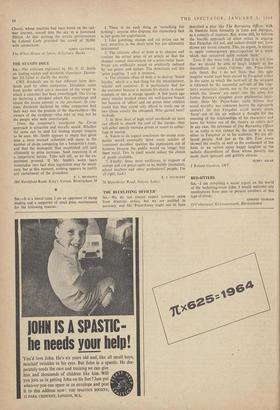SIR,—It is a moral issue. I am an opponent of
stamp trading and a supporter of retail price maintenance for the following reasons:
1. There is no such thing as 'something for nothing': anyone who disputes this elementary fact is fair game for exploitation.
2. Like gambling, stamps and cut prices can be very attractive in the short term but are ultimately detrimental.
3. The ultimate effect of both is to obscure and confuse the actual price of an article so that the shopper cannot discriminate on a price/value basis. Prices are artificially raised or artificially reduced by 'cut prices' and stamps. The Americans call this 'price juggling. I call it immoral.
4. The ultimate effect of both is to destroy 'brand loyalty,' which is a bad thing for the manufacturer, retailer and customer. It is particularly bad for the customer because it restricts his choice. A classic example of this is orange squash. A few years ago every retailer stocked about six well-known brands but because of 'offers' and cut prices most retailers found that they could only afford to stock one or two (these usually the cheapest). Who gained here? Nobody.
5. In these days of high retail overheads no store can afford to absorb the cost of the stamps—they will either openly increase prices or resort to subter- fuge to recoup.
6. Taken to its logical conclusion the stamp com- panies would eventually drive every retailer of 'consumer durables' (pardon the expression) out of business because the public would no longer buy them retail. This in itself would reduce the choice of goods available.
7. Finally; those most vociferous in support of stamps and cut prices seem to be mainly journalists, school teachers and other professional people. I'm all right, Jack?
R. 1. HAYIIURST






























 Previous page
Previous page